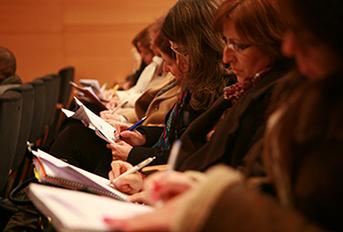Associação Portuguesa de Investigação em Cancro
«Cancro-Educar para Prevenir» – Professores, os novos promotores de campanhas de educação para a prevenção do cancro
«Cancro-Educar para Prevenir» – Professores, os novos promotores de campanhas de educação para a prevenção do cancro

O projeto «Cancro - Educar para Prevenir» surge da necessidade de conceber e validar novas estratégias, mais eficazes e abrangentes, na área da prevenção do cancro.
O projeto foi centrado na formação de professores, proporcionando-lhes competências para implementarem campanhas na área da prevenção de cancro. Os 54 professores envolvidos no projeto, após a formação, dinamizaram campanhas de prevenção do cancro junto das suas comunidades escolares, abrangendo um total de 42 escolas das regiões Norte e Centro do país, envolvendo um universo de mais de 5.000 alunos.
A avaliação do impacto desta iniciativa mostrou um aumento significativo dos conhecimentos e perceções sobre cancro nas comunidades escolares, demonstrado a relevância e viabilidade desta modelo inovador.
Autores e Afiliações:
Ana Barros1,2 Luís Moreira3 Helena Santos4 Nuno Ribeiro1 Luís Carvalho1 Filipe Santos-Silva1,5
1Public Awareness of Cancer Unit, Cancer Institute of Pathology and Molecular Immunology of University of Porto – Ipatimup, Porto, Portugal.
2Faculty of Sciences of University of Porto – FCUP, Porto, Portugal.
3Department of Research Methodology and Data Analysis, Health School of Vila Nova de Gaia – Piaget Institute, Vila Nova de Gaia, Portugal.
4Autonomous Section of Social Sciences, Faculty of Economics of the University of Porto – FEP, Porto, Portugal.
5Department of Pathology and Oncology, Faculty of Medicine of the University of Porto – FMUP, Porto, Portugal.
Abstract:
Cancer is one of the leading causes of death worldwide, and thus represents a priority for national public health programs.
Prevention has been assumed as the best strategy to reduce cancer burden, however most cancer prevention programs are implemented by healthcare professionals, which constrain range and educational impacts. We developed an innovative approach for cancer prevention education focused on high-school biology teachers, considered privileged mediators in the socialization processes. A training program, ‘‘Cancer, Educate to Prevent’’ was applied, so that the teachers were able to independently develop and implement prevention campaigns focused on students and school-related communities. The program encompassed different educational modules, ranging from cancer biology to prevention campaigns design. Fifty four teachers were empowered to develop and implement their own cancer prevention campaigns in a population up to five thousands students. The success of the training program was assessed through quantitative evaluation – questionnaires focused on teachers’ cancer knowledge and perceptions, before the intervention (pre-test) and immediately after (post-test). The projects developed and implemented by teachers were also evaluated regarding the intervention design, educational contents and impact on the students’ knowledge about cancer. This study presents and discusses the results concerning the training program ‘‘Cancer, Educate to Prevent’’ and clearly shows a significant increase in teacher’s cancer literacy (knowledge and perceptions) and teachers’ acquired proficiency to develop and deliver cancer prevention campaigns with direct impact on students’ knowledge about cancer. This pilot study reinforces the potential of high school teachers and schools as cancer prevention promoters and opens a new perspective for the development and validation of cancer prevention education strategies, based upon focused interventions in restricted targets (students) through non-health professionals (teachers).
Revista:
Plos One
Link:
http://www.plosone.org/article/info%3Adoi%2F10.1371%2Fjournal.pone.0096672




